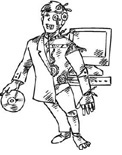
‘Progress’ Comes to a Small Town
THE INTERSTATE, BOOM BOXES, DRUGS & TEXACO...
I was once standing right in the middle of Lloyd, Florida, when a car pulled beside me and the driver asked about the town’s whereabouts. Lloyd sits in a neglected corner of northern Florida’s Jefferson County, the watermelon capital of the world, as people used to boast, adding that the county also had the state’s largest population of rattlesnakes. I was transplanted from rural Wisconsin to Lloyd at the age of nine, and two things during my first days there made deep impressions on me: one was the sound of the screen door that led from the wide porch into the central hallway of the house that used to be my grandfather’s, and that we then rented from my aunt. The sound was that of space, the slap of the door echoing up the curving stairwell, down and around the long hallways, and to the top of — I can only guess — a 14-foot ceiling. It was also the sound of age; the simple wooden door stretched a slightly rusted spring, and its rebounding slap echoed against the simple elements — wood and plaster — of an older architecture, and suffered no stifling by wall-to-wall carpets, acoustical tiles, or air conditioning.
The second thing was the road in front of the house, a road paved with small stones. It was curbless, so that there was a very vague line between where sand and grass ended and pavement began. The road was frequently shaded by large live oaks, especially up at the corner where the branches of two in front of Coxetter’s store leaned over the road to join hands with a third at the side of the store’s lot, and from the arc of the branches dropped strings of Spanish moss. I pedaled my little bike up the center of that road, and though I was intent on getting up to the store to trade in some empty bottles and a few cents for an RC Cola, I was still attentive enough to be aware of the particular character of this little stretch of road — something in the combination of the covering branches, the Spanish moss, and the midday stillness not broken, only accentuated, by the steady drone of the cicadas. Much older now, I interpret the impression as somewhat like that created by the screen door, a sense of age — yet the feeling involved here was heavier and more subduing, the kind one gets when entering a usually closed-up parlor.
In a very small town like Lloyd, one cannot remain a stranger for long. Our home, in fact, soon became a point of focus for the village — partly because my mother is a descendant of the Lloyds, but mostly because “Doc,” my father, provided a lot of work for some of the local boys. Every Saturday a small gang came early to the house, a gang mostly formed by Samuel, Horace, William, and Isaiah, all black. We cut brush, felled trees, and pulled stumps, mainly trying to clean acreage around the house we rented and around the house we were renovating-just kitty-corner to us, another home of my mother’s ancestors. I learned hard work with these boys, the ability to swing a sledgehammer in an unbroken rotation — never letting it drop after a blow on the wedge — and in the places where I followed them, the watermelon fields and soybean fields.
You May Also Enjoy
Francis’s soundbite approach to theology has been a disaster for the Church. But worse have been the machinations from which the dissembling serves to distract us.
The bishop must announce to the rich and poor, to the powerful and weak the fullness of truth, which sometimes irritates and offends, even if it always liberates.
Enlightenment philosophers undermined religion but failed to provide a workable substitute, and the void they created continues.

